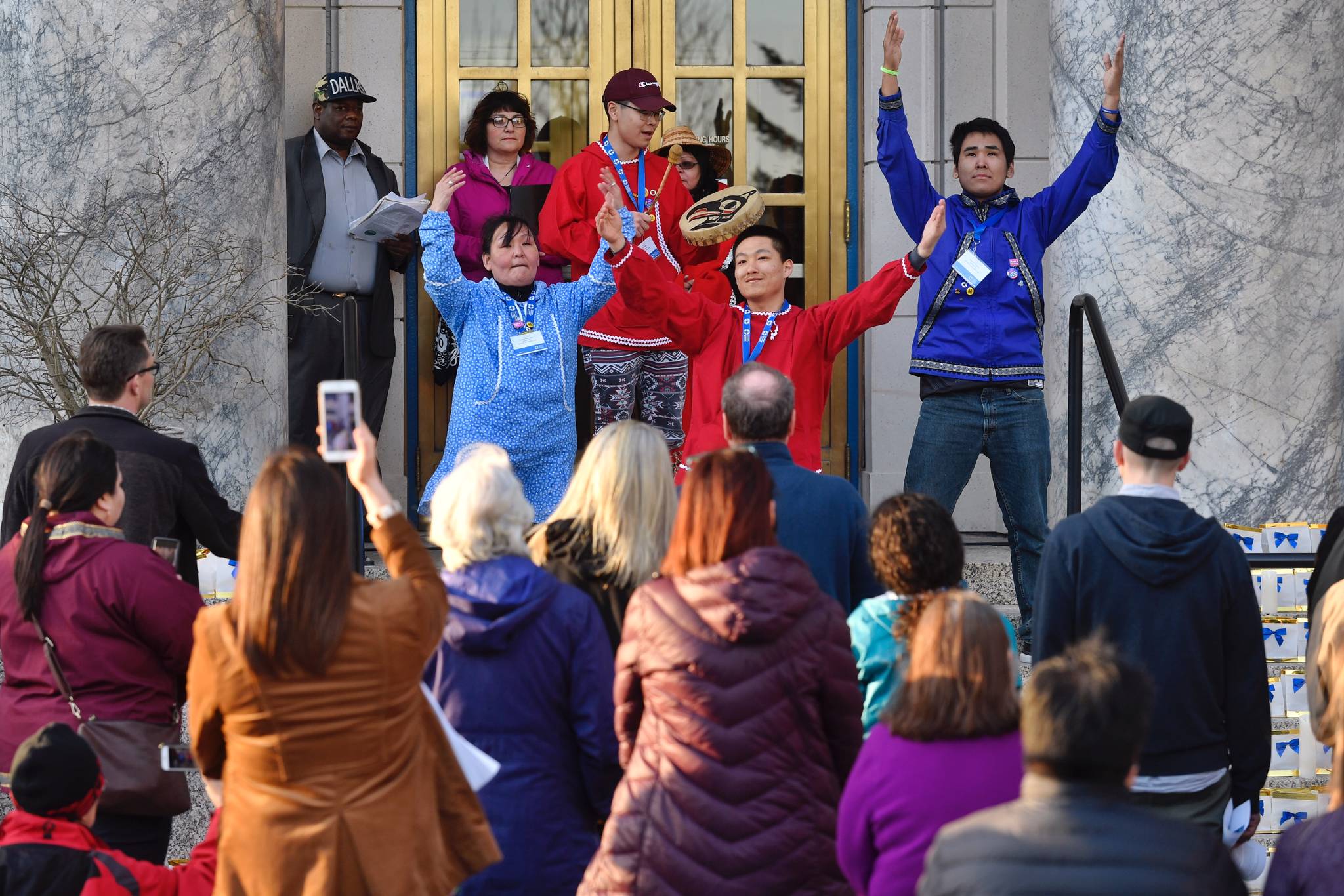Every time she hears that someone in the community died by suicide, Juneau resident Kristina Jager thinks the same thing: Do I know them?
She’s starting to understand that it doesn’t matter.
“We are connected to everyone in this town,” Jager said. “If one person takes their life, it has a ripple effect that reaches every person.”
She said that just a couple hours before Tuesday’s vigil, she had gone through that same line of thinking when she heard that a Juneau man died after jumping from the Douglas Bridge.
Jager was one of a dozen people who spoke on the steps of the Alaska State Capitol on Tuesday night during the We Remember Them Night of Remembrance, organized by the Alaska chapter of the American Foundation for Suicide Prevention, the Alaska Statewide Suicide Prevention Council and the Juneau Suicide Prevention Coalition. One of the main themes, as Jager shared, was that everybody is affected by suicide whether they know it or not.
James Biela, the lead field advocate for the Alaska chapter of AFSP, had spoken earlier in the day to gathered legislators and Capitol staff about suicide prevention and awareness, and moderated Tuesday night’s vigil.
[Movie night moves suicide into public focus]
Speakers Tuesday included five legislators, Biela, survivors who had lost friends and family to suicide, a representative for Alaska’s U.S. senators and other advocates. Around 100 people were in attendance as the wind whipped past the Capitol, including all three of Juneau’s lawmakers. Attendees held battery-operated candles, nodded along with speakers’ talking points, wiped away tears at some points and hugged each other on occasion.
Both at his talk during the day and at the vigil, Biela shared frightening statistics about the prevalence of suicide in Alaska. The state has the second-highest suicide rate of any state, multiple speakers said. An Alaskan dies by suicide every 44 hours, versus 48 from 2016, and it’s now the fifth leading cause of death in the state, Biela detailed earlier in the day.
Rep. Geran Tarr, D-Anchorage, talked briefly about losing her brother to suicide. Tarr is the sponsor of House Bill 22, which would extend the termination date of the Statewide Suicide Prevention Council (SSPC) to 2027. On the Senate side, Sen. Scott Kawasaki, D-Fairbanks, brought forth Senate Bill 10, which also seeks to extend the council’s existence.
[Suicide prevention bill gains bipartisan support in the Senate]
Tarr only spoke for a couple minutes, but asked those in attendance to hug or high-five or even just say hello to the people standing next to them.
“Let’s create that space of goodness,” Tarr said as people embraced, “because it’s in the goodness that we keep each other close and remember the love that we feel all around us.”
Rep. Sharon Jackson, R-Eagle River, expressed similar sentiments. She implored people to interact with their neighbors and long-lost friends in a more meaningful way than just a text or an email. She echoed what Biela said to people in the Capitol during the day, that a major way to eliminate stigma around suicide is to talk about it. As Jackson said, “silence is not an option.”
Ethan Therchik, an 18-year-old from Toksook Bay, spoke about losing three of his closest friends and family members to suicide in a span of less than two years. It took time before he could process the tragedies and realize he wasn’t to blame, he said.
“You’ll start saying, ‘I wish,’ ‘I should have,’ ‘Why didn’t I,’” Therchik said. “Those words are what I started saying to myself. I blamed myself for so long.”
Barbara Franks, chairperson of the SSPC, said her son died by suicide in 1996, long before there were suicide hotlines or websites with resources to help people through tragedy. Over the years, like Therchik, she’s learned how to process her pain and help others.
She said people don’t need to have all the answers for a family member or friend who’s experiencing suicidal thoughts. They just need to pay attention and listen, she said.
“You don’t need to know what to say,” Franks said. “As long as I know you’re in arm’s reach, and will pick me up when I fall, I’ll be OK.”
Editor’s Note: Suicide is a serious topic. If you’re in trouble and need help, please talk to someone. If you don’t think you can talk to someone in person, call the Alaska CARELINE at 1-877-266-HELP, or visit the National Suicide Prevention Lifeline, the Alaska Community Mental Health Centers, or juneausuicideprevention.org.
• Contact reporter Alex McCarthy at amccarthy@juneauempire.com. Follow him on Twitter at @akmccarthy.

